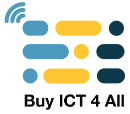Smart Cities for All: A Discussion on Inclusion with City Leaders
September 25, 2017
Contact: Luis Artieda, [email protected] , +1 571-426-1360.
- G3ict and World Enabled partner with the city of Rio de Janeiro to promote digital inclusion of all citizens
- Experts bring decades of experience, innovative tools, and global networks to support creation of effective programs and policies in Brazil
Rio de Janeiro– September 25th – The City of Rio de Janeiro has invited G3ict and World Enabled – two nonprofits with extensive global leadership in inclusive cities and accessible technology – to assist with the city’s efforts to ensure that persons with disabilities and older persons can benefit from the city’s investments in smarter public services. As a part of this visit, the City of Rio de Janeiro along with World Enabled and G3ict will host “Smart Cities for All: A Discussion on Inclusion with City Leaders.” This event explores ways in which city agencies can leverage technology to promote innovation and inclusion. The event takes place from 9:00 to 12:30 pm in City Palace, Rua Sao Clemente, 360-Botafogo.
“Talking about digital inclusion is talking about wealth generation and social inclusion. Therefore, the meeting with Victor Pineda and James Thurston, is a moment of learning and renewing hope for people with disabilities in Brazil,” said Geraldo Nogueira, Undersecretary in the Mayor’s Office for Persons with Disabilities, City of Rio de Janeiro.
The event convenes city leaders in disability rights and technology programs, from both public and private sector organizations, including: Undersecretary for Persons with Disabilities, City of Rio, Municipal Company of Informatics (IPLANRIO), Committee on the Rights of Persons with Disabilities of the Brazilian Bar Association (OAB), Municipal Council for the Defense of the Rights of Persons with Disabilities - Rio de Janeiro (COMDEF), Accessibility Standing Committee - CPA; Rio de Janeiro Department of Education; Federal University of Rio de Janeiro (UFRJ) - Laboratory of Research and Development in Assistive Technology; and the Microsoft Corporation, etc. The event describes how cities can deploy accessible technology that works for all members of a society. City leaders also will address the challenges they face when deploying smart city services and digital inclusion programs.
“We applaud the city of Rio for its strong commitment to the digital inclusion of all their citizens, including those with disabilities,” said James Thurston, Vice President for Global Strategy and Development at G3ict. “And we believe that the Smart Cities for All global initiative can help them achieve their Information and Communication Technology (ICT) accessibility goals”. Dr. Victor Pineda, President of World Enabled added, “what cities like Rio have been asking us for are tools to help them make progress. In partnership with industry, government, and disability organizations we are building and deploying those tools.”
This event showcases the Smart Cities for All Toolkit -- which is now available in English, Spanish and Portuguese versions. Several additional language versions are currently in development. The kit contains four tools to help Smart Cities worldwide include a focus on ICT accessibility and the digital inclusion of persons with disabilities and older persons. It supports a range of organizations and roles related to Smart Cities. Each of the tools addresses a priority challenge identified by global experts as a barrier to the digital inclusion of persons with disabilities and older persons in Smart Cities.
About Smart Cities for All
In 2016, G3ict and World Enabled launched a research project to assess information and communication technology (ICT) accessibility in smart cities around the world. They surveyed more than 250 experts and smart city program managers, 60% of whom responded that smart cities were failing people with disabilities. Only 18% of respondents knew of a smart city that uses ICT accessibility standards. As a result of the findings, and with support from Microsoft, the two NGOs created the Smart Cities for All Toolkit, featuring four digital tools to help those involved in city planning to make future technology projects more inclusive. James Thurston, Vice President at G3ict and Dr. Victor Pineda, President at World Enabled, lead the Smart Cities for All initiative launched in 2016. Both James and Victor are leading accessibility experts who are committed to building a broad global coalition to ensure that persons with disabilities and older persons enjoy the advances of smart cities on an equal basis with other citizens
Dr. Victor Santiago Pineda is the President of World Enabled. He also serves as president the Global Alliance on Accessible Technologies and Environments (GAATES). Dr. Pineda is a recognized leader in international disability rights and was appointed by US President Barak Obama to the Architectural and Transportation Barriers Compliance Board. He teaches city planning at University of California, Berkeley. Dr. Pineda has received numerous awards, including a National Science Foundation (NSF) Innovation research grant, a Fulbright Hays Scholarship, and the AAPD Paul G. Hearne Leadership Award. Mr. Pineda received a B.A., B.S. and M.C.P. from the University of California, Berkeley and a Ph.D. from the University of California, Los Angeles.
James Thurston is an internationally recognized technology policy leader. As G3ict’s Vice President for Global Strategy and Development, he leads the design and implementation of new programs to scale up G3ict’s global impact. He has served as advisor to high-ranking government leaders in the US and abroad on technology policy, human rights, and digital inclusion. He has experience applying both technology and public policy to important social and economic challenges. He holds broad policy and management experience in both the private and public sectors and at the federal, state, and international levels of government. Prior to joining G3ict, Mr. Thurston was Director of International Accessibility Policy at Microsoft, where he developed and executed a worldwide strategy to expand the company’s outreach on disability and technology issues. Mr. Thurston holds both a Master of Public Administration and an M.A. in East European Studies from the University of Washington, as well as a B.A. in International Affairs from the University of Maine.







